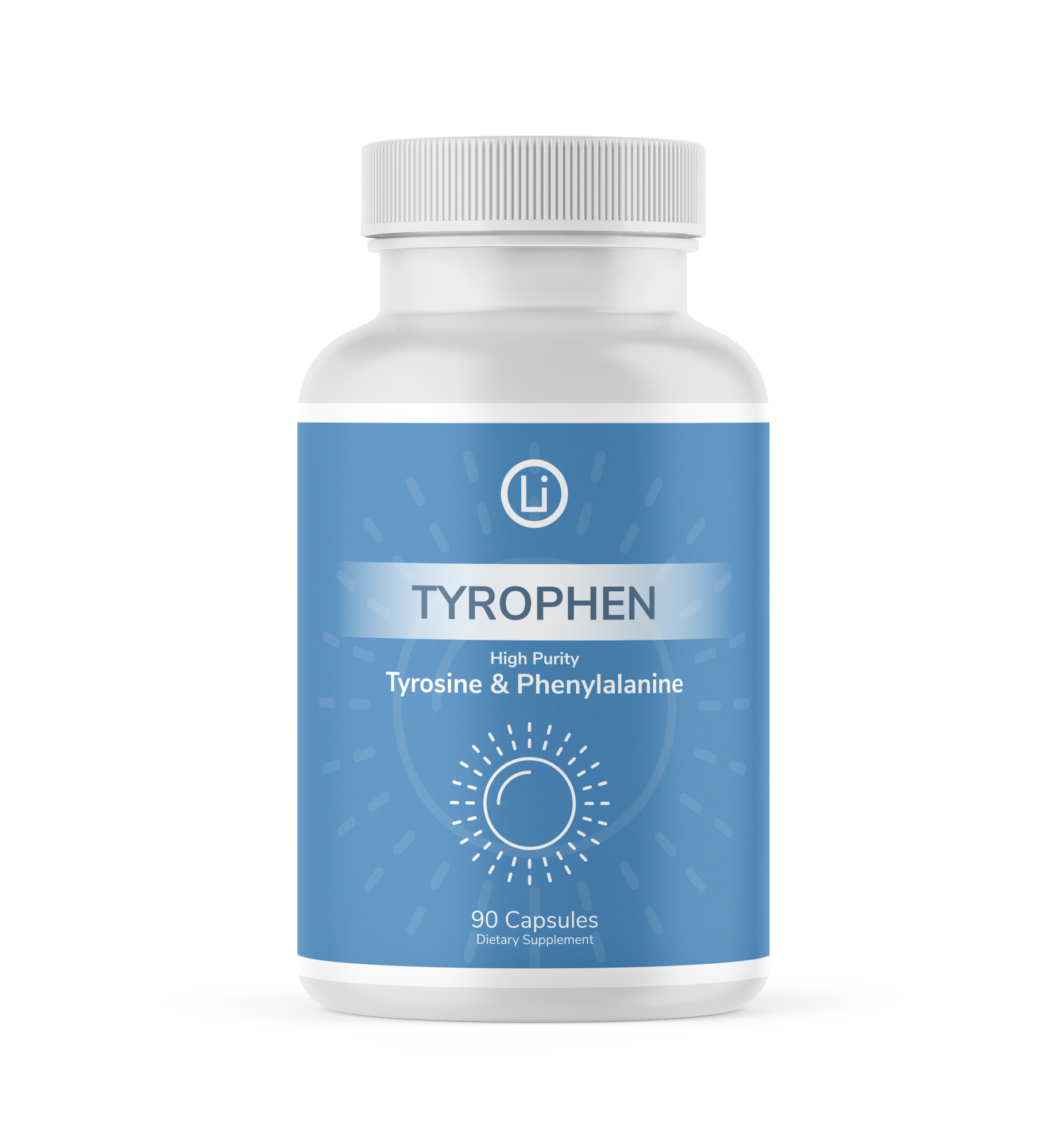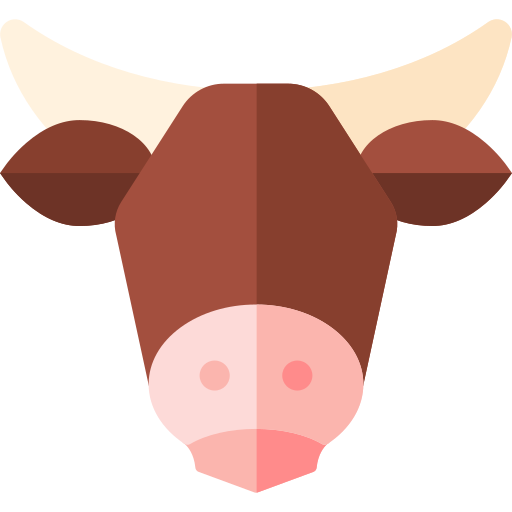TyroPhen
- Dopamine
- Thyroid Support
Tyrosine & Phenylalanine Capsules
L-Tyrosine & DL-Phenylalanine (99+% purity) in a bovine gelatin capsule. Nothing else.
The most significant and studied aspects of L-Tyrosine and DL-Phenylalanine are that they are both amino acids that are precursors to Dopamine, and Thyroid hormone. Learn more about this in the supplement background tab.
Third-party lab tested for purity.
- Save 10% on every subscription
- Free shipping in US & Canada over $100
- Cancel/Pause any time
- Dopamine synthesis*
- Thyroid hormone production support*
- Improved motivation*
- Improved focus*
- Attention deficit assistance*
- Regulation of reward-seeking behavior*
- May assist with addiction-alleviation*
- Aids melanin production*
- Adrenal support*
- Prolactin lowering*
- Serotonin lowering*
*These Statements have not been evaluated by the Food and Drug Association, or Health Canada. These products are not meant to diagnose, treat, cure, or prevent any diseases.
Each bottle contains: 90 capsules
Servings per container: 90
Each capsule contains:
L-Tyrosine: 225mg
DL-Phenylalanine: 225mg
Other ingredients: gelatin (bovine)
Take 1 capsule daily, with or without food, during daylight hours. Best taken before spending time outdoors in natural light for dopamine activation.
1. Coull JT, Hwang HJ, Leyton M, Dagher A. Dopamine precursor depletion impairs timing in healthy volunteers by attenuating activity in putamen and supplementary motor area. J Neurosci. 2012 Nov 21;32(47):16704-15. doi: 10.1523/JNEUROSCI.1258-12.2012. PMID: 23175824; PMCID: PMC6621775.
2. During MJ, Acworth IN, Wurtman RJ. Phenylalanine administration influences dopamine release in the rat's corpus striatum. Neurosci Lett. 1988 Oct 31;93(1):91-5. doi: 10.1016/0304-3940(88)90018-3. PMID: 3211373.
3. Roiser JP, McLean A, Ogilvie AD, Blackwell AD, Bamber DJ, Goodyer I, Jones PB, Sahakian BJ. The subjective and cognitive effects of acute phenylalanine and tyrosine depletion in patients recovered from depression. Neuropsychopharmacology. 2005 Apr;30(4):775-85. doi: 10.1038/sj.npp.1300659. PMID: 15688090; PMCID: PMC2631648.
4. Hardman CA, Herbert VM, Brunstrom JM, Munafò MR, Rogers PJ. Dopamine and food reward: effects of acute tyrosine/phenylalanine depletion on appetite. Physiol Behav. 2012 Mar 20;105(5):1202-7. doi: 10.1016/j.physbeh.2011.12.022. Epub 2011 Dec 30. PMID: 22230253.
5. Hitsman B, MacKillop J, Lingford-Hughes A, Williams TM, Ahmad F, Adams S, Nutt DJ, Munafò MR. Effects of acute tyrosine/phenylalanine depletion on the selective processing of smoking-related cues and the relative value of cigarettes in smokers. Psychopharmacology (Berl). 2008 Mar;196(4):611-21. doi: 10.1007/s00213-007-0995-5. Epub 2007 Nov 25. PMID: 18038222.
6. Lou HC. Dopamine precursors and brain function in phenylalanine hydroxylase deficiency. Acta Paediatr Suppl. 1994 Dec;407:86-8. doi: 10.1111/j.1651-2227.1994.tb13461.x. PMID: 7766968.
7. Fernstrom JD, Fernstrom MH. Tyrosine, phenylalanine, and catecholamine synthesis and function in the brain. J Nutr. 2007 Jun;137(6 Suppl 1):1539S-1547S; discussion 1548S. doi: 10.1093/jn/137.6.1539S. PMID: 17513421.
8. Riley PA. Melanin. Int J Biochem Cell Biol. 1997 Nov;29(11):1235-9. doi: 10.1016/s1357-2725(97)00013-7. PMID: 9451820.
9. Iuvone PM. Regulation of retinal dopamine biosynthesis and tyrosine hydroxylase activity by light. Fed Proc. 1984 Sep;43(12):2709-13. PMID: 6147273.
10. Elkin RG, Featherston WR, Rogler JC. Effects of dietary phenylalanine and tyrosine on circulating thyroid hormone levels and growth in the chick. J Nutr. 1980 Jan;110(1):130-8. doi: 10.1093/jn/110.1.130. PMID: 7354377.
11. H.L. Wang, V.H. Harwalkar, H.A. Waisman, Effect of dietary phenylalanine and tryptophan on brain serotonin, Archives of Biochemistry and Biophysics, Volume 97, Issue 1, 1962, Pages 181-184, ISSN 0003-9861, https://doi.org/10.1016/0003 9861(62)90062-0.
TyroPhen Background Information
L-Tyrosine & DL-Phenylalanine - Dopamine & Thyroid Precursors
The most significant and studied aspects of L-Tyrosine and DL-Phenylalanine are that both amino acids are precursors to Dopamine, and Thyroid hormone.
The building blocks of thyroid hormone production:
Iodine + Tyrosine --> monoiodotyrosine (T1) and diiodotyrosine (T2)
T1 + T2 --> T4 (thyroxine) & T3 (triiodothyronine, needs selenium too)
The biological pathway to dopamine (mediated by enzymes):
L-Phenylalanine --> L-Tyrosine --> L-Dopa --> Dopamine.
Dopamine is one of those buzzwords that gets thrown around very often in day-to-day scenarios. It's not always completely out of context, but it often misses the larger picture.
While dopamine is involved in getting rewarded and excited by things, it also plays an important role in not getting over-rewarded or feeling rewarded or stimulated by things that are not necessarily serving us for the better.
Interestingly, clinical trials study this by creating a Tyrosine and Phenylalanine deficiency in patients or animal models and then applying the stimulus or variable that they wish to test. Some fascinating results of studies like this have been quicker reaction time and less inclination towards smoking.
Another fascinating aspect of L-tyrosine is its crucial component in melanin production. "The critical step in melanin biogenesis is the oxidation of tyrosine by the enzyme tyrosinase." Riley, P. (1997).
This means that Tyrosine is a light-absorbing amino acid that helps us produce pigment for our hair and skin. It's important to note that our exposure to natural light also helps promote the conversion of tyrosine into dopamine.
It may seem that Tyrosine is the main goal - but here's why consuming Phenylalanine is still beneficial and important:
While Tyrosine can be synthesized in the human body, it is created by converting Phenylalanine, which cannot be synthesized and must come from the diet.
Therefore, we can deduce the importance of consuming Phenylalanine but also understand the importance of Tyrosine itself. Consuming both amino acids allows the body to have some supply of Tyrosine and a reserve of its building blocks in case it needs to convert more.
Moreover, a study by Wang, H. L. (1962) called "Effect of dietary phenylalanine and tryptophan on brain serotonin" showed that not dietary Tyrosine but Phenylalanine consumption was able to lower body and brain serotonin. If you have studied or are a fan of the work of Dr. Ray Peat and his extensive explanations on serotonin and its harmful effects in excess, then you will appreciate the value in that.
As Fernstrom, J. (2007) says, "physiologic factors that influence brain pools of these amino acids, notably diet, influence their rates of conversion to neurotransmitter products, with functional consequences."

TyroPhen








- MDMichel D.Verified BuyerI recommend this productRated 5 out of 5 stars3 months agoMy Wife loves this product
I recently bought this to try. As usual my wife starting using it as soon as I brought it home. The next morning she said "Wow, that stuff worked, it kept here focused for hours" She then proceeded to let me know she is keeping the bottle. Lol
So, I can't say if it works, I never had a chance.
Dr. Michel
Was this helpful? - SMSara M.Verified BuyerI recommend this productRated 5 out of 5 stars5 months agoNoticed a focus improvement
I’ve been very productive and motivated this summer on home projects. I’ve never felt so focused and driven.
Was this helpful? - LCLaurent C.Verified BuyerI recommend this productRated 5 out of 5 stars6 months agoGood
Nice artkl
Was this helpful? - TBTiffany B.Verified BuyerI recommend this productRated 5 out of 5 stars9 months agoLiterally Life Changing!!!!
This product is unlike anything I have ever had. I was recently diagnosed with ADHD and I heard reviews about this product being great for it. I am over the moon excited to have this in my life. Pairing this with natural sunlight makes everyday seem more enjoyable, manageable and clearer. I am able to do tasks with ease where before I felt stuck and unable to do anything. I am so thankful and grateful for this product and all the other amazing products from Lifeblud. It pairs well with Toro and I also take Energy+ and feel like a superstar everyday.
Was this helpful? - EKerika K.Verified BuyerI recommend this productRated 5 out of 5 stars9 months agoNatural thyroid support
This has been a great just in case supplement, that I’m using to support my thyroid while tapering down a prescription for thyroid that I don’t actually need.
Was this helpful?





